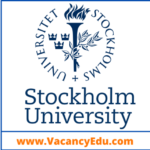Utrecht University, Netherlands invites online Application for number of Fully Funded PhD Positions at various Departments. We are providing a list of Fully Funded PhD Programs available at Utrecht University, Netherlands.
Eligible candidate may Apply as soon as possible.
(01) PhD Positions – Fully Funded
PhD position summary/title: PhD position in Mass Spectrometry-Based Antibody Analysis
The primary objective of the project is to further develop mass spectrometry-based techniques to sequence and identify circulating antibodies. Our lab
introduced innovative methods to enrich antibodies of interest (e.g. anti-viral antibodies) from individual serum samples. You will further develop and optimize these methods, with as special aim to enrich for antigen-specific antibodies. A secondary key objective is to improve bioinformatic and AI tools to analyse the mass spectrometry data and improve the de novo sequencing workflows. Your work will lead to new antibody leads, that can be recombinantly produced and ultimately tested for efficacy and development into therapeutics.
Deadline : 1 December 2025
(02) PhD Positions- Fully Funded
PhD position summary/title: PhD position in dynamic stress catalysis
Better catalysts are needed for a more sustainable chemical industry, but steady-state catalysis faces fundamental limitations. Deforming (straining) a catalyst back and forth in a dynamic fashion can theoretically boost catalytic performance, yet methods to induce >0.1% strain at relatively high frequency (100–1000 Hz) are lacking. Our group recently demonstrated a new method to dynamically stress catalyst bodies at high strain levels and up to 1000 Hz using piezoelectric actuators. We also showed a proof-of-concept of 30× enhanced catalytic performance in the hydrogen evolution reaction. However, the mechanism behind this effect remains unclear, and the influence of dynamic stress on selectivity and stability is unknown.
As a PhD in this project, you will investigate how dynamic stress influences the performance of catalyst bodies in CO2 activation reactions using operando characterisation method. You will work in a team together with a postdoctoral fellow, who will focus on the effect of vibrations on thermal catalysis and on developing X-ray operando characterisation methods. Your work will contribute to a new research line at the interface of catalysis and structural dynamics. This project has potential for wide-reaching implications for sustainable chemistry. In particular for the production of chemicals like methanol or ethylene with minimal waste and energy input.
Deadline : 15 December 2025
View All Fully Funded PhD Positions Click Here
(03) PhD Positions – Fully Funded
PhD position summary/title: PhD: Unravelling Clogging Mechanisms in Porous and Fractured Rocks
Clogging in geological formations poses critical challenges for subsurface applications from geothermal energy to CO₂ and hydrogen storage. While individual clogging mechanisms have been studied extensively, the dynamic interplay between physical particle deposition, chemical precipitation, and deformation-induced particle remobilisation remains poorly understood. These processes vary fundamentally across rock types – from porous sedimentary to fractured crystalline systems, with volcanic and altered crystalline rocks presenting unique intermediate cases. Recent advances in operando micro-computed tomography (µCT) enable unprecedented real-time visualisation of these processes, yet systematic investigation across diverse rock types and integration with predictive models remains lacking.
In this PhD study, you will be performing experiments and numerical simulations to understand and predict the clogging evolution in a range of geological media by:
- Quantifying physical and chemical clogging dynamics across a spectrum of rock types (porous sedimentary, porous volcanic, altered crystalline, and fractured crystalline rocks) using 4D µCT imaging
- Establishing the role of deformation in particle remobilisation and preferential flow path creation that controls clogging patterns
- Developing predictive digital rock physics and permeability evolution models from µCT data using machine learning and computational tools (PuMA/CHFEM/MOOSE) validated against experimental observations
- Bridging scales from pore-level processes (µm) to sample-scale behaviour (cm) through integrated experimental-numerical approaches
To achieve this, you will be doing in-situ experiments using our state-of-the-art in-house Zeiss Versa 610 µCT-scanner equipped with custom flow-through cells to capture clogging evolution. In addition, we will apply for beamtime at a synchrotron facility across Europe for critical experiments requiring very high imaging rates or ultra-high resolution. These experiments will be coupled with large- and small-scale flow-through experiments, using capabilities available at the High Pressure and Temperature Laboratory (in collaboration with Dr Suzanne Hangx) and the Porous Media Lab (in collaboration with Dr Amir Raoof) at the Department of Earth Sciences, to examine particle mobilisation thresholds, and how stress-induced deformation remobilises particles, creates new flow pathways, and redistributes clogging zones. Your experimental data and observations will be used to upscale from pore-scale physics to continuum behaviour.
If you are thrilled to dive deep into the world of real-time imaging for sustainable energy solutions, this is a great opportunity for you! This position offers you the chance to explore your passion for understanding the impact of subsurface activities and boost your career with high-impact research in a field that is rapidly growing.
Deadline : 14 December 2025
(04) PhD Positions – Fully Funded
PhD position summary/title: PhD position on Land-ocean interaction across the K/Pg boundary
We seek candidates who are motivated by the proposed research, take initiative to develop ideas, are self-driven and can work independently and within a team. Applicants should hold a MSc degree in Earth Sciences, Biology, Environmental Sciences, Chemistry, or a related discipline by the time the position starts. Non-Dutch MSc diploma’s may be subjected to specific approval by the Board for Conferral of Doctoral Degrees before the candidate can be accepted in the PhD programme.
Furthermore, you should have:
- Experience in processing geological samples
- A theoretical background in sedimentology, stratigraphy and paleoclimate
- Statistics and/or coding experience
- A willingness to do fieldwork as well as work in a laboratory
- A flair for written, graphical and oral communication.
- And above all, creativity and curiosity
Due to the international character of our research, good command of spoken and written English is essential. We highly encourage applicants from all members of our community and of diverse backgrounds to join us.
Deadline : 4 January 2026
(05) PhD Positions – Fully Funded
PhD position summary/title: PhD position on Novel experimental turbidity currents in the TurbiFlume
More than 10,000 submarine canyons connect the continents to the deep ocean. These canyons are the conduits for transport of land-derived materials to the ocean floor in avalanche-like events called turbidity currents. Turbidity currents transport enormous amounts of sediment and Particulate Organic Carbon (POC) and bury this in deposits below the ocean floor. They additionally convey abundant nutrients and oxygenated water masses, which together with the POC (as food) support conditions for abundant life at unexpected depths in the absence of light for photosynthesis. Submarine canyons are also called the ‘human connection to the deep sea (Dissanayaka et al., 2023)’. Unfortunately, this connection brings land-derived pollutants (microplastics, pesticides, pharmaceuticals) into the very heart of these ecodiverse hotspots, making them vulnerable to far-field human interference. While this general knowledge is established, the processes of transport and burial during turbidity current events remain poorly understood.
Previous experimental research into turbidity currents has been fundamental in generating the basic understanding of how they shape deep marine environments. Real world monitoring of turbidity currents is challenging and risky due to the difficulty of reaching submarine canyons and the sometimes violent nature of turbidity current events. But despite these challenges, a flurry of recent successes in real world monitoring has resulted in various additional insights and hypotheses that have not been tested or reproduced in the laboratory yet. This includes aspects and phenomena such as the role of dense frontal cells and basal layers, substrate erosion, flow ignition, the distinction between high- and low-density flows, and effect of submarine canyon dynamics such as tides, internal waves, nepheloid layers, and up- and downwelling. This body of work suggests that conventional experimental structures are not sufficient to fully understand the dynamics of turbidity current processes in natural environments. The TurbiFlume set-up in the Earth Simulation Laboratory of Utrecht University has been designed and implemented to overcome some of the limitations that have prevented experimental contributions to these newly emerged themes. This project will utilize the TurbiFlume set-up to establish a new framework for experimental turbidity currents that goes beyond previous studies. The results will form a platform for future research that quantifies the role of submarine canyons as conveyors of sediments, carbon, pollutants, nutrients, oxygen, and heat from the continental shelves to the deep ocean.
Deadline : 5 January 2026
Polite Follow-Up Email to Professor : When and How You should Write
Click here to know “How to write a Postdoc Job Application or Email”
(06) PhD Positions- Fully Funded
PhD position summary/title: PhD Candidate in Exposomics, Machine Learning and Artificial Intelligence
In this PhD project, you will design and apply innovative computational approaches, such as graphical models, penalised structural models, and large language models (LLMs), to investigate associations between disease outcomes and complex, high-dimensional, time-varying exposure data. You will integrate rich exposome datasets with multiple omics layers (including genomics, proteomics, metabolomics, and microbiomics) to uncover how environmental factors shape human health at the molecular level.
You will collaborate closely with leading experts in epidemiology, omics, and environmental health within the Gravitation program Exposome-NL, a national research consortium that brings together more than fifty scientists from diverse disciplines and institutions across the Netherlands.
Deadline : 5 January 2026
(07) PhD Positions – Fully Funded
PhD position summary/title: PhD Position: Unlocking the potential of after school care
A growing number of children are enrolled in Dutch after-school care. They spend a considerable amount of time in these after school programmes, almost half of the time they spend in school. This suggests that these programmes can contribute significantly to children’s broad development. Especially with an increasing focus on academics in primary education, there is a great potential for after school programmes to foster other areas of development, including various interests, social-emotional skills, and citizenship to name a few. However, still little is known about the quality of after school care and how it relates to children’s well-being and their broad development. This PhD study aims to address this gap by evaluating the pedagogical quality of after school care and children’s experiences in this field. Key questions are:
- Which structural quality characteristics predict process quality? (Study 1)
- Which profiles of after school care programs emerge in Dutch practice and how are they related to children’s wellbeing and engagement? (Study 2)
- What is the children’s voice and their views and experiences in after school care? (Study 3)
- How do caregivers strike a balance of children’s individual needs in dyadic caregiver-child relations and the dynamics of the group? (Study 4)
Deadline : 30 November 2025
(08) PhD Positions – Fully Funded
PhD position summary/title: PhD position in Neuroscience
We are looking for a collaborative and responsible new colleague, you:
- Hold, or are about to complete, a Master’s degree in Biology, Psychology, Physics or Engineering.
- Preferably have an interdisciplinary background. Previous microscopy and/or data analysis training are strong assets.
- Demonstrate a strong interest in, or prior experience with, neuroscience.
- Are interested in neuroethology and animal behavior.
- Have programming skills or a strong willingness to learn them.
- Speak and write proficient academic English.
Deadline :15 December 2025
Click here to know “How to Write an Effective Cover Letter”
(09) PhD Positions – Fully Funded
PhD position summary/title: PhD: Integrated Assessment Modelling of Climate Feedbacks, Tipping Points
Climate change is driven in part by complex feedback mechanisms within both natural and human systems. Some of these feedbacks can lead to so-called tipping points: critical thresholds beyond which the climate system may shift abruptly and potentially irreversibly. These processes are not yet fully integrated into the analysis of integrated assessment models (IAMs), which are used to support policymakers in designing effective climate strategies.
In this PhD project, you will work on improving the representation of feedbacks, tipping points, and extreme events in the MIMOSA model, a flexible IAM that links climate dynamics with socio-economic processes. You will develop an inventory of critical feedbacks, translate them into model representations, and conduct uncertainty analyses to evaluate their impact on cost-effective climate pathways. You will also explore the expansion of MIMOSA with a simplified energy system module and investigate linkages with the more detailed IMAGE model.
The project is embedded in the broader EMBRACER programme, which aims to advance our understanding of climate feedbacks. You will therefore collaborate with colleagues in climate science, systems modelling, and policy analysis.
Deadline : 19 December 2025
(10) PhD Positions – Fully Funded
PhD position summary/title: PhD position in Polymer-Extracellular Vesicle (EV) Hybrids
We are looking for a collaborative and enthusiastic PhD student who meets several or all of the following criteria:
- you hold a Master’s degree in pharmaceutics, molecular life sciences, biomedical technology, drug innovation, (bio)chemistry or a related discipline with affinity for both chemistry and biology;
- you have a solid background in, or a strong motivation to develop expertise in, polymer chemistry, extracellular vesicles, bioconjugation and nanomaterials science, in vitro experimentation, (bio-)analytical & physical-chemical characterization of biomaterials, and fundamentals of biomaterial-cell interactions;
- you thrive in a multidisciplinary research environment that brings together pharmaceutical sciences, chemistry and biology;
- you are able to balance independence with teamwork by planning and executing experiments autonomously while contributing to a collaborative environment and shared scientific goals within the research group;
- you show perseverance and flexibility in addressing complex, multifaceted scientific challenges;
- you communicate clearly and effectively in English, both in writing and speech.
Deadline : 4 December 2025
Connect with Us for Latest Job updates
(11) PhD Positions – Fully Funded
PhD position summary/title: PhD Candidate in Agent-Based Modelling and Urban Health: Designing for Movement
A better future for everyone. This ambition motivates our scientists in executing their leading research and inspiring teaching. At Utrecht University, the various disciplines collaborate intensively towards major strategic themes. Our focus is on Dynamics of Youth, Institutions for Open Societies, Life Sciences and Pathways to Sustainability. Sharing science, shaping tomorrow.
At the Faculty of Veterinary Medicine we train the veterinarians and researchers of the future, provide care for animals and conduct leading and societal relevant research. That is what we are good at. We see that the health and welfare of animals, humans and the environment are interconnected. By sharing our knowledge and working together, we make positive impact, both nationally and internationally. Our 1,500 students and 950 staff members inspire and strengthen each other. Our engagement connects us. The drive to, from an integral perspective, make the world a better place.
Deadline : 31 December 2025
Polite Follow-Up Email to Professor : When and How You should Write
(12) PhD Positions – Fully Funded
PhD position summary/title: PhD Position in Paleoclimatology
The sea level in the Eemian was much higher than today, 3 to 6 m or even higher. The high sea levels during the Eemian cannot be explained by a complete melting of the Greenland ice sheet, as large parts of it survived the Eemian stage. This implies that the Antarctic ice sheet was also very vulnerable to melting during this period, but little model studies are done on the Antarctic contribution. The aim of this research project is to further investigate the timing of major sea level changes, and thus the contribution of the Greenland and Antarctic ice sheets during the Eemian by generating high-resolution proxy records from the Dutch subsurface, including the type locality of the Eemian near the city of Amersfoort. Special emphasis will be on the varying background conditions between the Saalian to Eemian transition (i.e., termination II), when large ice sheets formed the Dutch coastline and the adjacent North Sea, and that of the LGM-Holocene transition (i.e., termination I), when large ice caps lay further north. The comparison between these new datasets and experiments with ice sheet models could lead to a better long-term projection of the Greenland and Antarctic ice sheets in our warming world.
The project is highly multidisciplinary and collaborative. Proxy data will amongst others infer the stable isotope composition of foraminifera and mollusc shells, since not much is known about the changes in temperature and isotopic composition of the waters flooding the Netherlands and other parts of Northwest Europe during past interglacial periods, such as the Eemian. The study is expected to shed new light upon (1) the timing and possible cause of rapid sea level changes during the Eemian, and (2) the complex interactions between global warming, sea level changes, glacial rebound and sediment transport on a more regional scale.
The position is part of the Earth System Feedback Research Centre (EMBRACER), which focuses on the carbon and water cycle feedbacks within the climate system. EMBRACER includes 23 principal scientists from a wide variety of disciplines, from physics, environmental, earth and social sciences in the Netherlands. The EMBRACER community of students and staff will have regular cross-disciplinary meetings, events and lots of opportunities to get in contact with the wide spectrum of climate science. The project will also have close links with Past to Future (P2F), a 4-year Horizon Europe research project which was launched in March 2025, consisting of 24 partners from a wide-range of disciplines in future climate model development, paleo-climate data collection, and applied mathematics.
Deadline : 19 December 2025
(13) PhD Positions – Fully Funded
PhD position summary/title: PhD Position: Feedbacks and Agency in Future Water Use
Rising population numbers and economic growth are the cause of increased water withdrawal from rivers, lakes and groundwater. Combined with climate change, this can cause water scarcity, groundwater depletion and ecosystem deterioration. In order to assesspast and future trends in water scarcity and explore possible solution pathways, hydrologists and environmental scientists have developed global hydrology and water resources models. In these models, future water use is typically based on the projections of integrated assessment models. However, it is likely that societies will formulate response strategies to imminent water scarcity. For instance:
- farmers may change water source, irrigation technology, crop type, cultivars and sowing dates;
- thermoelectric or thermonuclear power plants may adapt their cooling technologies;
- the domestic sector will search for alternative water sources such desalinisation or treated wastewater;
- the manufacturing sector to less water-intensive production processes or even products.
In this PhD project, we aim to include this type of adaptation agency into a new generation of water use models. Adaptation strategies will be based on both economic principles, risk profiles and regulatory conditions (water policy and governance). The resulting water use model will be generic so that it can be used in any hydrological model. In the work, we explore these strategies as part of the hydrology model PCR-GLOBWB and the integrated assessment model IMAGE3.
A personalised training programme will be set up, reflecting your training needs and career objectives. About 20% of your time will be dedicated to this training component, which includes training on the job in assisting in the Bachelor’s and Master’s programmes of the department.
Deadline : 19 December 2025
(14) PhD Positions – Fully Funded
PhD position summary/title: PhD Position: Scalable Offshore Floating PV Systems
Your tasks and responsibilities are:
- developing digital models that accurately predict the performance of FPV systems under offshore conditions, including wave dynamics, albedo effects, and system heat transfer;
- studying floater stability, system losses, degradation mechanisms, and developing accurate energy yield estimation under real environmental conditions;
- building a digital library of validated offshore FPV components (conceptual and market-ready) and environmental datasets to support flexible simulations;
- investigating grid connection options such as cable pooling and hybrid offshore renewable energy plant strategies (for example FPV combined with offshore wind and storage) particularly in the North Sea context;
- validating models using existing offshore datasets, lab-scale experiments, and collaborating with ongoing projects;
- developing optimisation algorithms for ensuring techno-economic feasibility of FPV systems, enabling testing of various scenarios and configurations;
- publishing research in international peer-reviewed journals and presenting at scientific conferences.
Deadline : 30 November 2025
(15) PhD Positions – Fully Funded
PhD position summary/title: PhD on Early Bilingual Language Development
In the PhD subproject, you work with Dutch-English bilingual families to collect and analyse a corpus of bilingual infant-directed speech. You also study bilingual infants’ language discrimination skills using headturn-preference experiments. In this research programme, you work in an interdisciplinary team with researchers from the fields of linguistics, psychology, and artificial intelligence. You receive assistance from student assistants in data collection and/or data processing and develop your academic teaching skills (during your project). The project will be carried out at the Institute for Language Sciences (ILS), at Utrecht University, the Netherlands.
Deadline : 1 December 2025
About Utrecht University, Netherlands – Official Website
Utrecht University is a public research university in Utrecht, Netherlands. Established 26 March 1636 (385 years ago), it is one of the oldest universities in the Netherlands. In 2018, it had an enrolment of 31,801 students, and employed 7,191 faculty and staff. In 2018, 525 PhD degrees were awarded and 6,948 scientific articles were published. The 2018 budget of the university was €857 million.
Utrecht University counts a number of distinguished scholars among its alumni and faculty, including 12 Nobel Prize laureates and 13 Spinoza Prize laureates. Utrecht University has been placed consistently in the top 100 universities in the world by prominent international ranking tables. The university is ranked the best university in the Netherlands by the Shanghai Ranking of World Universities 2019, ranking 13th in Europe and 49th in the world.
The university’s motto is “Sol Iustitiae Illustra Nos,” which means “May the Sun of Righteousness Enlighten Us”. This motto was gleaned from a literal Latin Bible translation of Malachi 4:2. Rutgers University, having historical connections with Utrecht University, uses a modified version of this motto.
Utrecht University is led by the University Board, consisting of prof. dr. Henk Kummeling (Rector Magnificus), prof. dr. Anton Pijpers (Chair) and prof. mr. Annetje Ottow (Vice Chair).
Close ties are harboured with other institutions internationally through its membership in the League of European Research Universities (LERU), the Utrecht Network and the European University Association (EUA).
Disclaimer: We try to ensure that the information we post on VacancyEdu.com is accurate. However, despite our best efforts, some of the content may contain errors. You can trust us, but please conduct your own checks too.
Related Posts




